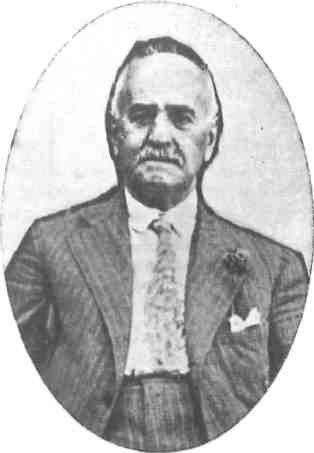
The memory of Dimitrios Polymeris is ever green in the hearts of his grateful heirs, the fruit farmers of Zagora, his native village located some 2000 feet above the Aegean on Mount Pelion in Thessaly. The survival of 3000 Pelion mountain people has depended on discipline, indefatigable diligence, the Greek Orthodox faith – and fruit orchards which are the legacy of Dimitrios Polymeris.
His marble bust stands at the junction of the two lifelines he created: the eight-kilometre paved Polymeris Road, spiralling like a ram’s horn down to the sea, and the 47-kilometre highway which leads from Zagora to the port of Volos, which today is Greece’s fourth largest city.
Farmers Apostolis, Andreas, Konstantinos and Stavros lead their mules, loaded with spraying machinery, passed the monument while Penelope, Katerina, Theologaika, and Calliope, their wives, ride side-saddle; followed by donkeys, white goats with their shaggy kids, mongrel dogs, and sheep. There are teachers, tailors, sailors, merchants, seamstresses, priests and mechanics in Zagora as well. They, too, are farmers, and two out of three would call themselves capitalists.
The marble gaze of Polymeris is fixed upwards towards the Plateia , the sacrosanct stage of Zagoran social life: no hoofed or horned creature may tread its slate floor. Under the leafy arbor formed by seven colossal plane trees, mustachioed old shepherds in caps and trousers the colors of tobacco, potato and putty, reminisced on their usual shady seats: nine low tree stumps forming a semi-circle around the kiosk in front of the campanile of St,George’s church.
“I worked for him when I was a boy up on the mountain when the first Polymeris Reservoir was built. He not only, paid for it; he himself worked on it every day. We would come down to the village for lunch and join him again later,” said Stefanos.
“I remember when the porous soil gave way and that reservoir broke. We were lucky the water fell away from the village,” responded Anghelos with a smile that revealed his last, loose tooth.
“But that event provided so many needed jobs, and he replaced it later,” countered Antonis.
In the twilight after siesta, as the shops reopen, the village elders take their accustomed chairs to watch the strolling players’ entries and departures from the five exits of the Plateia. They twirl their worry beads, talking of fruit prices, insecticides, and Polymeris. The doctor surveys the villagers whose lives had begun in his hands. He treats them for diseases his forebears themselves named: asthma, arthritis, rheumatism, emphysema, anemia, epilepsy, diabetes, and pleurisy. In emergencies he has sutured the wounds of mules as well as those of men. The village women brew their own analgesics from mountain herbs: camomile for sore throat, linden leaves for cramps.
“The mother of Polymeris died at his birth,” said the doctor to the circuit court judge sent up from Volos to determine the ownership of four coveted apple trees.
In the Plateia deals are made. The sale of a superannuated mule as mean as Ali Pasha is negotiated for a scandalous profit. Children flutter like bright butterflies around the memorial stele to the war dead. The tinsmith, the saddle-maker, and the ironmonger argue politics. An elopement is plotted in the shadows beside the entwined marble dolphins of the fountain. But there is no shoemaker, no hairdresser, no funeral director. The bearded clergy and the bereaved in mourning are silhouetted against the livelier activity in the square like black figures on an archaic Athenian urn.
Polymeris always wore a carnation Γ or gardenia in his buttonhole. When the girls admired it he would say that the flower was of an especially fragrant Californian species. If the girls came closer to inhale the aroma, he would kiss them,” said the retired mayor, narrowing his eyes at the latest strategy of two boys playing tric-trac. “He was so small – barely five feet tall – that when he sat on a chair, his feet didn’t even touch the floor,” said the town engineer, noting from the corner of his eye an intriguing package in the hands of his wife’s second cousin’s daughter-in-law as she left the oldest emporium on the square, the shop of George Raftopoulos. “When Polymeris left Zagora for Egypt, there were hundreds of thousands of other Greeks there,” Alekos, the retired surveyor, recalled with a friendly nod to Kyria Pitsou, who was gingerly carrying a tapsi of stuffed tomatoes to be cooked in the old brick oven with the loaves of the village baker.
When teachers at the Polymeris High School call the Roll of Honor, the name of Polymeris is ever present. Educators in the vast, new, stone, slate-roofed structure which marries the best of traditional Pelion architecture to the demands of pedagogy, render him homage:
“Polymeris was influenced by the example of earlier benefactors of Zagora who went to foreign capitals as clergymen or diplomats and sent back rare books or money for tuition or the salaries of teachers. He hoped to defend and preserve the culture they had built here in the forest.”
The many students who have received scholarships for advanced university studies from the legacy of Polymeris do not forget him.
“The day that he was born was a holy day,” wrote the head of the girls’ lyceum.
The high school, which was built from funds he left, is within view of the modest old stone house where his mother died in 1859. In this simple home behind the shops of the main street, within hearing of the bronze church bells and in sight of the sea, was nurtured this industrious, upright character and his humanitarian commitment to his fellow Zagorans.
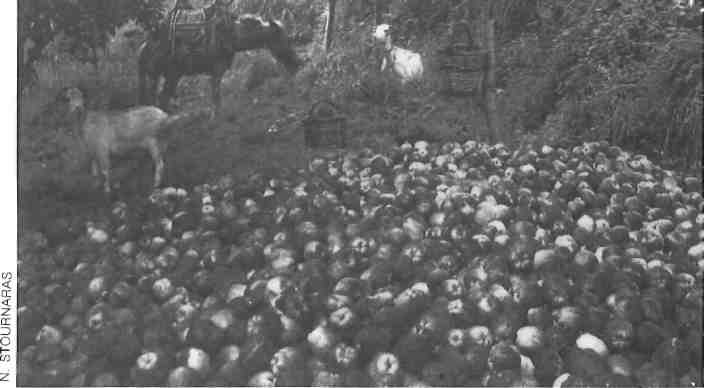
Who among the villagers can forget Polymeris? Certainly not Spyros, who was born in our own house – the dowry of the granddaughter of Spyros’ father, George, a muleskinner. It was Spyros’ grandmother who suckled the newborn, motherless Polymeris along with her own infant, Spyros’ father, born the same week as Polymeris. His team of mules occupied the back half of the ground floor of our house. Next door was an ancillary stone stable with a tiny plot of land which was given to Spyros when, at 35, he married Eugenia, ten years his junior, one of seven children of a tailor.
Spyros’ father wore the baggy wide-bottomed britches, the cummerbund, the tasselled fez, and smoked the serpentine Turkish water pipe. Greece, the young kingdom only partially liberated from Turkey, still ‘wore the yoke’ of Turkish customs and costume. Spiros’ mother died when he was 12, leaving her five children in their father’s Gare.
“He drank too much and he chased other women in Volos,” said the usually inarticulate Spyros, with a disapproving shake of his head. His. father’s refusal to allow Spyros to continue his education decided his destiny: he was put to work on the roads, with pick and shovel: saddling his two mules before sunrise, loading them with rock, gravel, sand and cement.
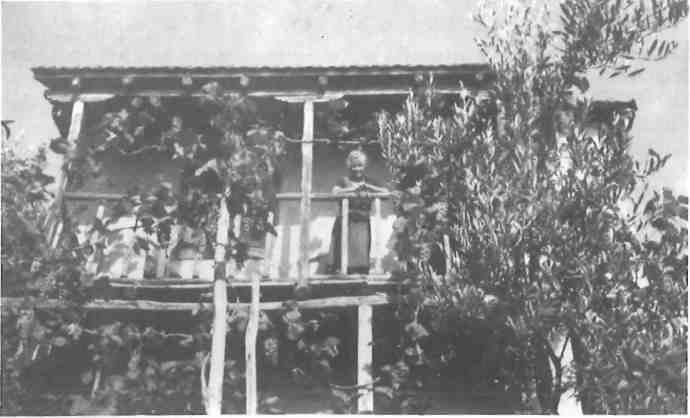
Across the mountain mantled with aromatic mint, thyme and oregano, on a raw trail which lurched and pitched and jolted through the forest of titanic beech, chestnut, oak, walnut, and plane trees, the realm of vixen, viper, boar and tortoise, Spyros led the mules loaded with produce, skirting unfenced precipices, and ravines wrought by torrential cataracts. In winter, to transport JIQ sick too weak to ride, he wore round snow shoes he fashioned from the supple wood of the cornel tree which bends without breaking. Four men thus shod carried the stretcher through three-metre-high snow to the hospital in Volos.
Surely Eugenia, Spyros’ wren-like wife, will always revere the memory of Polymeris. At her tasks in her tiny kitchen, at the hen-house, the goat shed, or while remending Spyros’ pants as she sits on a plank resting on two tree stumps in the shade of the camellias she grafts to sell, she recalled the benighted years that Polymeris’ legacy changed.
She spoke of him as she plunged her arms into the soapsuds in her wooden wash trough, between the stable door and her bread oven.
‘Before we had the Polymeris reservoir, there wasn’t enough water, so our gardens produced figs and grapes but very few trees. We brought water from the public roadside fountains. We couldn’t afford soap so I used wood ashes from the bread oven to launder.”
Her candid gaze is calm, her eyes the same grey, flecked with green, as the slate roofs overhead. Her heavy grey hair springs up in a wave from a widow’s peak, coiled in a braided chignon at the nape of her neck -well out of the way when she picks and packs fruit, milks the goats, and whitewashes the house.
“We had only potatoes to sell before the Polymeris road was built down to the sea,” she told me. Her small oval hands flicked a narrow rolling pin as she prepared her incomparable Ipita, a moist, custard-filled, flaky pastry. “I learned this recipe from the Egyptian servants in my aunt’s house at Chania. I was sent to work there to help them when I was four. I used to hurry to finish my tasks so I could watch and learn.”
“When we were children, we had no garbage or trash. We couldn’t buy anything, so there were no bottles or boxes to throw away as there are now that we have Polymeris’ paved roads,” she said, skillfully stuffing the mixture of meat, nuts, and raisins into the membranes of yellow squash flowers.
“Spyros is very intelligent. He was a good student. He wanted to stay in school but his father refused,” she said, turning the handle of her Turkish grinder preparing coffee for her husband’s return.
Before dawn, Eugenia and Spyros begin their day. Little by little the couple bought land and planted orchards. Thus their sons were able to attend the university and they are both now successful executives in Thessaloniki.
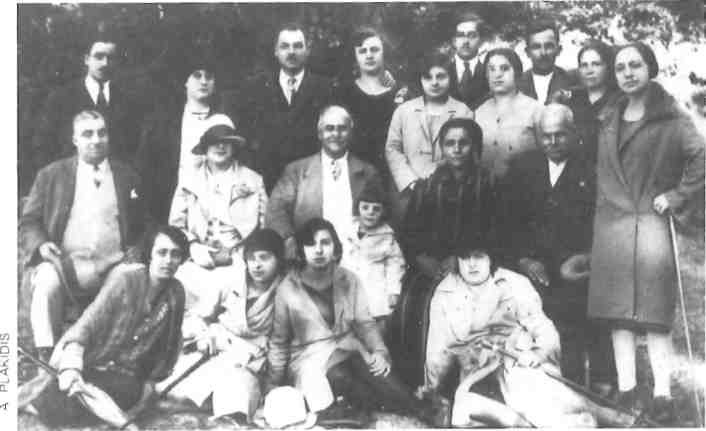
Nor can time scuttle the name of Polymeris among the sailors and fisher-men in their striped jerseys, mending nets on the floury sand at Horefto, the beach of Zagora. Their precarious lives are safer now that the harbor Polymeris left them is finished. “When the m-eltemi surprised us in the Aegean, we had no haven,” recalled George Papanikolaos in the checked neckerchief and faded indigo cap with braided trim on the neat visor that his son Nikos gave him on his birthday ten years ago.
“We had to take shelter in the great caves where the doves nest.”
For centuries, Mount Pelion has spawned shipwrights and seamen. Rich Zagora shipowners sent trading fleets to Egypt, Smyrna and Russia. The legendary ship of Jason’s Argonauts left the port of Iolkos in the Pagasitikos Gulf of the Bay of Volos to capture the Golden Fleece.
It was from Horefto that Polymeris embarked for Egypt on a dark autumn day in 1874. His father accompanied him down the stone trail through the wilderness to the sea. He blessed his 17-year-old son with the exhortation which would give direction to his odyssey: “Become a great man.” The boy bent and kissed the parental hand before boarding. He left behind his father and stepmother, stepbrothers and stepsisters.
Near the Plateia, white, slate-roofed patrician mansions of the oligarchy rode high above the Aegean like schooners moored among mulberry trees which fed the owners’ flourishing silk industry. Tower houses, four and five storeys high, scrutinized the horizon. Earlier raids by pirate caravelles had droven seaside settlements up the mountain.
The daughters of these fortunate families were designated as being “from a fireplace”, to distinguish them from the majority of Pelion’s inhabitants who relied on small stoves for heat. Their dowries consisted of gold and silver heirlooms; houses with wrought-iron balconies commanding panoramic vistas of the sea, over terraces enclosed by low stone walls and many fertile stremmata of land.
Narrow, steep cobblestone paths, no wider than a man and his mule, meandered upward and outward from the Plateia to where the many poor were lodged under leaking slate roofs in small white-washed houses. On small plots were stables, outdoor bread ovens, wood piles, arbors and a kaleidoscope of hydrangeas, potted gardenias, carnations, camellias and fuchsias. Roses boiled over at garden gates. In May, tiny circular wreaths of fresh flowers were hung over the front doors.
These families subsisted on potatoes grown at sea level, an hour’s walk away, and chestnuts from the forest. When the barefoot little girls of the poor grew up, no precious metal figured in their dowries. Instead they prepared for life with needle, thimble, embroidery hoop, spindle and shuttle. Braided oval doormats, hooked rugs of bright floral and geometric design, tablecloths with embroidered violets, pillow cases with appliqued ivy, curtains with cut-work butterflies, silken wall hangings, crocheted doilies, bureau scarves with French knots, tautly hemmed dish towels were readied. Saffron, indigo, straw, laudanum and pomegranate were gathered and brewed to dye homespun, handwoven coverlets and draperies. A plethora of sofa cushions with cross-stitched schooners accumulated in preparation for that festive day when the three-man orchestra would accompany the bridegroom, in his borrowed suit, on foot to fetch the bride. Well-wishers joined them as their merry epithalamium piped the couple up and down the village paths to the altar. There, the bearded priest exchanged twin wreaths of stephanotis above their heads. Outdoors, afterwards, guests joined hands to dance in a skipping circle about the trees. Some celebrated by firing pistols in the air.
Zagora is a village of tethers which link the shepherd boy to his agate-eyed white goat, the man to his mule, and the sheep to the donkey. Tendrils fasi ten grape vines, jasmine, honeysuckle and beanstalks.
Inexperienced and unskilled, Dimitrios Polymeris set out in search of health, education, employment and irrigation in order to stamp out illiteracy, unemployment and poverty and the lack of roads and transportation which cursed his proud, mountain home.
His struggle began on the lower Nile at Chibin El Kona with a succession of menial jobs and minimal earnings which left no margin for the accumulation of capital he needed. He borrowed funds to begin his own business; bad luck and inexperience brought only a bitter crop of debt. After 14 years, his few holdings were auctioned off to pay the 16,072 Egyptian piastres he owned a Mr A. Pantos, and the 6,545 piastres he owed Mr A. Pantazopoulos.
With his hopes for success in Egypt dashed, he borrowed, at the age of 31, to buy his ticket to New York. He must learn English; he would take any honest work.
As so many, before and after him, he started as a restaurant apprentice; hawked flowers, sold onions, mended shoes. In a letter to his stepbrother George he said he would return to Greece only when he was rich. Disappointment succeeded unlucky ventures until he formed a partnership with another Thessalian emigrant five years his junior, Apostolus Ringas.
Constantine Ringas, president of the Hellenic-Cyprus -Mediterranean Lines, seated in the vast, circular, slate courtyard of his mother’s girlhood home in Zagora, described, in his crisp British accent, the partnership of his father with Dimitrios Polymeris, his godfather. In the 5-metre-high reception rooms hang photographs of his passenger ships; in albums are old sepia photographs of his beautiful, elegant, dark-eyed mother in her Park Avenue apartment.
Glasses offered by his hospitable, patrician wife and demure daughters clinked in the cool dusk. Ringas’ large powerful radio, permanent-press Bermuda shorts, and the polyglot conversation of his foreign visitors contrasted with the agrarian simplicity of life in neighboring Zagoran gardens.
“It was really the 1895 Chicago World’s Fair which launched Polymeris and my father. Father was from another Pelion village, Kanalia, and the pair started a small restaurant at the Fair which was successful.” he said.
With their profits the partners rented a little Manhattan restaurant, the ‘Columbus’. They later bought this restaurant, and, shortly thereafter, about 1900, the New York Central needed their land for the railroad. They sold out at a profit sizeable enough for them to consider retirement. But when a nearby hotel was offered to them, they bought it and renamed it The ‘Athena’. The construction of Grand Central Station across from the ‘Athena* made it the natural stopover.
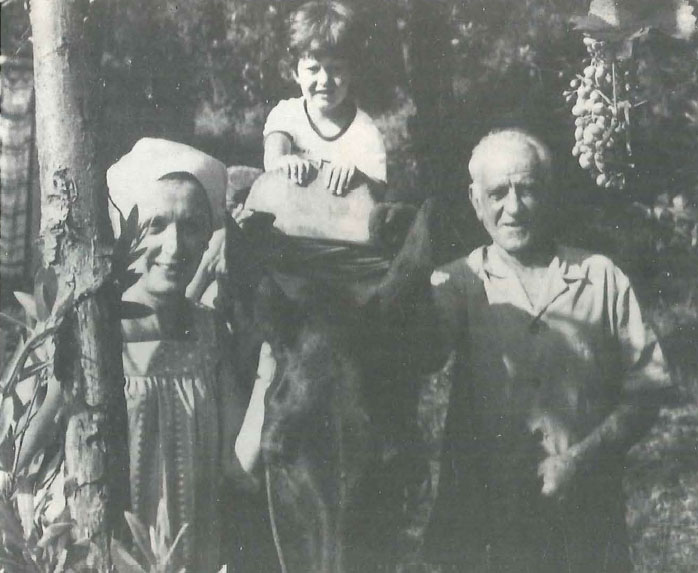
Seven Corinthian columns graced the eight-storey hotel, whose cafe, brasserie and restaurant for 150 tables occupied the ground floor, where the Manufacturers Hanover Trust Building now stands. Greek and American flags were displayed; murals of Athenian monuments framed diners on the left opposite murals of the Pyramids, Vesuvius, and Jerusalem. Fifty solicitous, uniformed waiters from Thessaly served a cosmpolitan clientele while employees from Zagora opened oyster shells in three subterranean pantries. “Even after he became rich, Polymeris never had more than two suits in his closet,” continued Mr Ringas. “It was the unreasonable demands of the unions that made the hoteliers finally decide to return to Greece. They sold the ‘Athena’ for four million dollars, and went home.”
The tethers and tendrils of nostalgia brought Polymeris home to Greece when he was 63. It was in 1920, after a silence of many years, when George, his stepbrother received his letter saying that it was time the emigrant came back.
Before his little Zagora homestead, and amidst the chorus of braying, whinnying, cackling, bleating, quacking, buzzing and crowing, Polymeris wept. Forty-six years had elapsed since his poignant farewell to his late parent -expatriate decades in which he had fulfilled his father’s wish that he become a great man.
Upon his return, he found children who had no shoes and men without shoelaces. He assessed the need for paved roads to permit the development of the fertile lands between Zagora and the sea, the urgent necessity for an irrigation system and a reservoir, and the deficiencies in education. He was determined to do something for his fellow Zagorans.
The farmers held a reception for their benefactor when he made his first triumphant automobile trip down the paved road to the sea. That horn-shaped road so crucial to the cultivation of fruit trees, has become a horn of plenty, a veritable cornucopia.
Orchards now fall to the sea in flounces – pears, apples and cherries flourish above and below the village. In the middle are peaches, apricots, plums and hazel nuts. Thirteen thousand tons of Delicious apples are harvested every year. A vast refrigeration plant expands annually.
In the last years before his death, Polymeris spent his winters in Athens buying and managing real estate but in summer he came back to Pelion to live in the house where he was born; to share in the marriages, baptisms, and funerals which mark the interlocking lives of Zagora.
The death of Polymeris in 1942 during the Occupation was hastened by starvation due to famine. His visionary legacy was jeopardized by lawsuits brought three times by a woman purporting to have been his wife. The courts rejected her claims three times to declare the villagers his heirs.
His will provided for a reservoir, a high school, scholarships, a hospital, a harbor, legacies for relatives, and dowries for his nieces. He negotiated with the Greek government to lend the road construction fund 100,000 English pounds for 30 years, on condition that priority be given to construction of paved roads from Zagora to Horefto, and from Zagora to Volos. His parish church received a clock tower and a bronze bell.
And they haven’t forgotten the philanthropist whose impassioned legacy pollinated Pelion so that today’s young people are not compelled to leave, as he was, to find work.
The tomb of a great man, says a Greek adage, is not located in a specific place, but rather, in the minds of other men.







